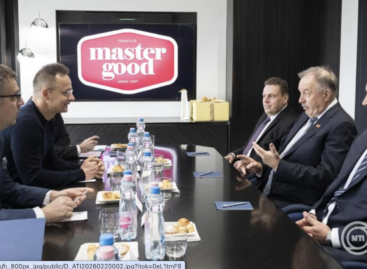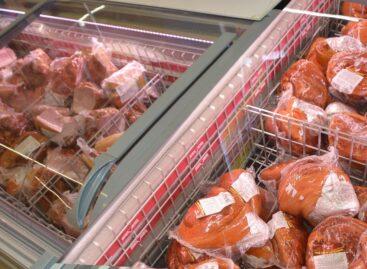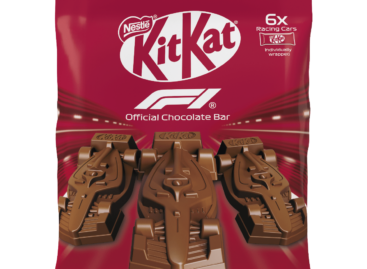F&B innovations in the Hungarian reality
Siemens Zrt. and Trade magazin organised their first joint conference on food innovations on 8 November. Zsuzsanna Hermann, CEO and editor-in-chief of Trade magazine was the moderator.
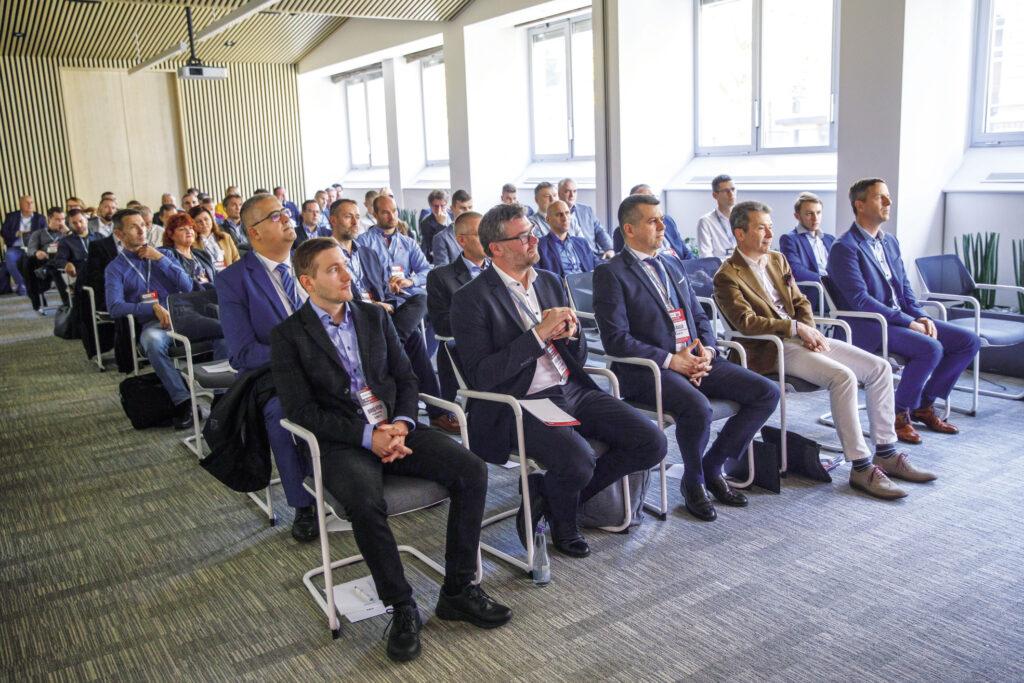
The first joint event of Simens Zrt. and Trade magazine was full house and surrounded by intense interest
This article is available for reading in Trade magazin 2023/12-01
In his welcome speech Tamás Jeránek, the CEO of Siemens Zrt. emphasised that the automation and energy distribution company has always been present in the food industry – one of the industries with the greatest potential.
Nestlé innovations and market challenges
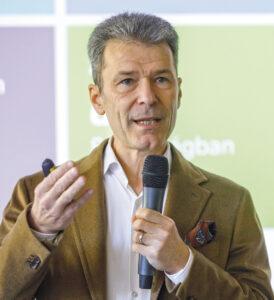
Péter Noszek
CEO Nestlé Hungária
In his presentation Péter Noszek, the CEO of Nestlé Hungária pointed out that innovation has played a prominent role in the company’s life from the very beginning, always based on the latest consumer trends. In response to the growing demand for plant-based products and with the health of the planet in mind, Nestlé has moved towards vegan product development with the Garden Gourmet range, and with the launch of vegan versions of iconic brands such as the vegan KitKat.
Which way is the market going?
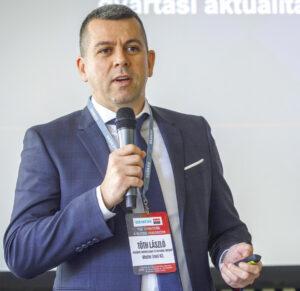
László Tóth
general food and
production director
Master Good
MasterGood has embarked on a path of automation, robotics, digitalisation and artificial intelligence and László Tóth, the company’s general food and production director recommends this to anyone who wants to make their business more efficient, profitable and competitive.
He spoke about the brownfield intralogistics investment in Kisvárda, which reduced the number of logistics staff by a third, enabling the company to address labour shortages in production, and it lowered the refrigeration cost by 25% per product.
Challenges and potential solutions
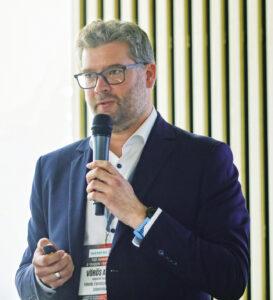
Attila, Vörös
managing director
FÉSZ
Attila Vörös, managing director of FÉSZ called attention to the fact that food processors, positioned in the middle of the value chain, are in a difficult situation because they were the least able to pass on their cost increases in 2022 and 2023 – according to the data from the Central Statistical Office (KSH). The managing director sees no reason for optimism and expects the sector to face tough months. This is due to the uncertainty on the input side (energy costs, packaging and raw material prices, etc.) and the sharp decline in consumption.
What can the next year bring?
A roundtable discussion followed, where the food industry’s expectations, challenges and future innovation development directions were discussed. László Tóth said the scenario of fierce price competition next year was a rather plausible one, and not only in Hungary. Péter Noszek was confident that even if 2024 won’t be bright, the decline in volume sales will slow down from the current 15-20%. Attila Vörös expressed his fears about 2024 and said there are many areas where new hurdles may manifest for manufacturers.
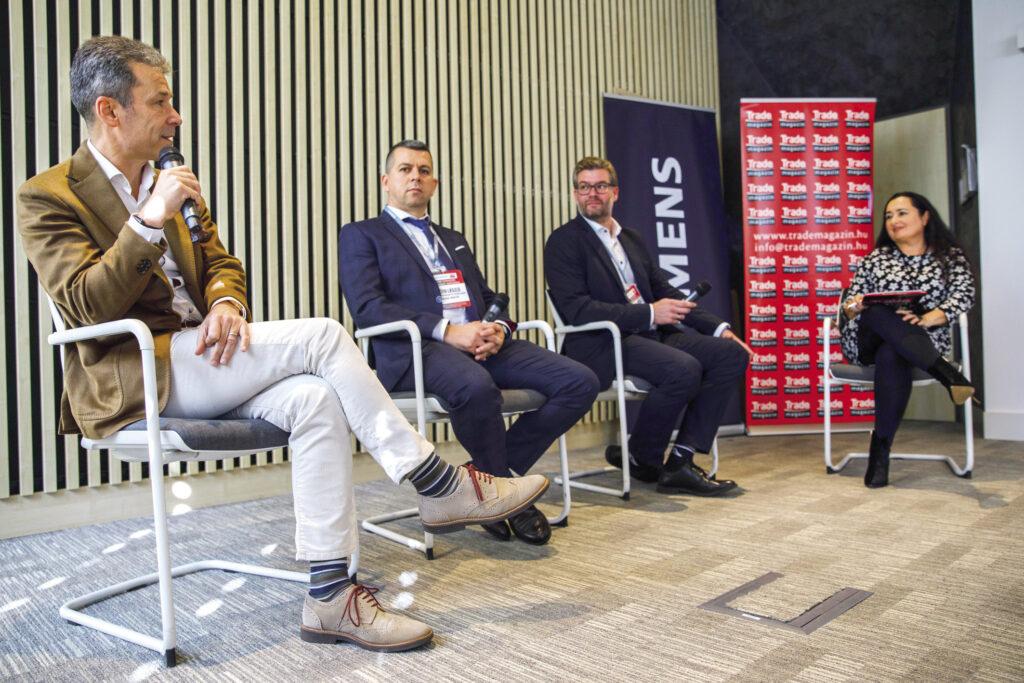
The roundtable discussion with invited speakers touched upon topics such as investment financing, cybersecurity and expectations for 2024-25
Energy management and sustainability
In the second part of the conference, Siemens experts introduced solutions that can help market players survive.
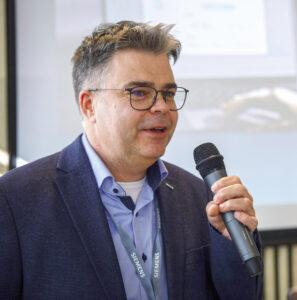
András Simon
industrial energy efficiency
and sustainability expert
Siemens Zrt.
András Simon, industrial energy efficiency and sustainability expert of Siemens Zrt. presented ideas on how to meet sustainability criteria. According to him, food production can do the most for sustainability and energy savings by creating a transparent and digital value chain, and by complying with the ever-stricter EU regulations.
Energy management can play a major role in this, and a system such as the Siemens SiGREEN platform, makes it easier to meet the requirements of the carbon tariff that has been in place since 1 October.
Intralogistics is important for everyone
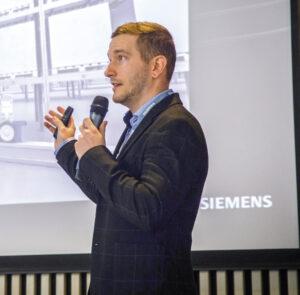
Péter Boros
account manager
Siemens Zrt.
Péter Boros, account manager of Siemens Zrt. brought a video presentation that was both forward-looking and relevant to the Hungarian reality. In the context of warehouse automation and robotics in production, he called attention to the role of artificial intelligence, which is able to make autonomous decisions following machine learning and to react to changes in production in real time. He explained that a relatively simple, low-cost investment can make a big difference to a company’s logistics processes: automation can be started in small steps.
More obligations to come
According to Dr Gábor Gergely Szabó, senior regulatory lawyer at Bán, S. Szabó, Rausch & Partners law firm, the NIS2 Directive on cyber security should be seen as an opportunity to gain a competitive advantage over other market players and to develop a stable system. Compared to NIS1, NIS2 has significantly expanded the range of sectors and companies affected – about 2,500-3,000 medium and large Hungarian firms.
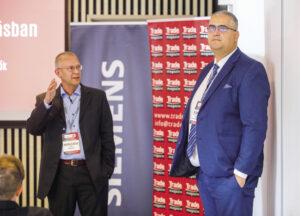
Attila Brechler expert, Siemens Zrt.,
dr. Gergely Gábor Szabó, senior regulatory lawyer
Bán, S. Szabó, Rausch & Partners
Siemens Zrt.’s expert Attila Brechler added: cyber security is a problem mainly because manufacturers are at least 20 years behind: there are no IT experts who know manufacturing, are familiar with automation processes and can protect information. The trends of the last five years (Industry 4.0, industrial digitalisation, Covid) and the fact that we are now digitally connected to everything have led to vulnerability.
Efficiency increasing in processes
Reflecting on the presentations of the day, Péter Szakos, F&B account manager of Siemens Zrt. told that in order to manufacture products of the same quality from the diverse raw materials entering the food processing industry, and to serve real consumer needs with new or modified products, companies need well-validated and designed systems, and digitally collected and managed data. This is where the “digital twin” can help: the real world is digitally mapped in an intelligent system at the level of designs, equipment, products, and manufacturing processes, and then integrated into the operating system to simulate virtually anything. //
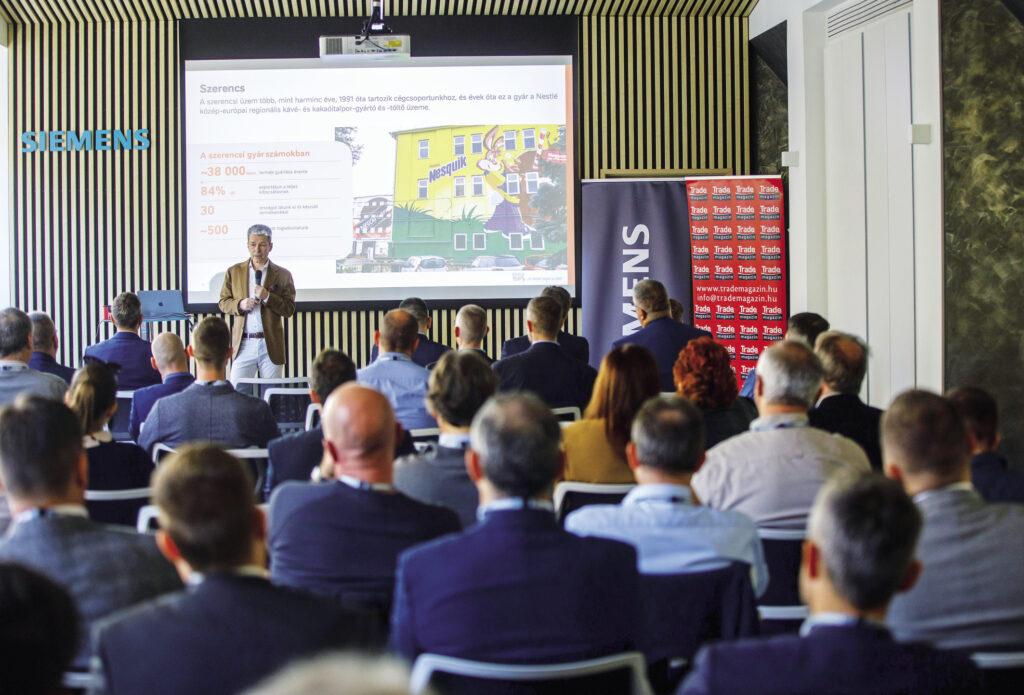
Useful presentations, good questions, precise professional answers were typical to the November event at Siemens Zrt.
//

Péter Szakos
F&B account manager
Siemens Zrt.
Péter Szakos has been working in the Siemens ecosystem for more than 20 years. During his career, he has been involved in automation and energy projects for public buildings and industrial facilities, from sales to implementation. //
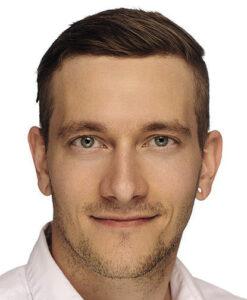
Péter Boros
sales specialist
Siemens Zrt.
His area of expertise is intralogistics. During his nine years at Siemens, he has been involved in many projects in Hungary and abroad, ranging from small automated systems to the implementation of complete logistics centres. //
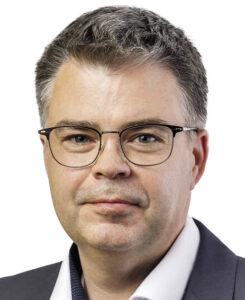
András Simon
energy management
and idustrial sustainability
expert
Siemens Zrt.
For fifteen years he has been responsible for technical support in the design, manufacturing and commissioning of energy distribution and industrial automation systems. In the last six years he has been focusing on energy management and industrial sustainability. //
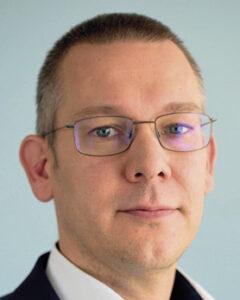
Attila Brechler
technical supporter
Siemens Zrt.
For more than ten years, he has been working in the industrial automation support team of Siemens Zrt. He has worked on and supported several automation projects with technical solutions. //
Related news
Ham seasons: the bad, the better and the good (?)
🎧 Hallgasd a cikket: Lejátszás Szünet Folytatás Leállítás Nyelv: Auto…
Read more >Related news
New country director at the helm of JYSK Hungary
🎧 Hallgasd a cikket: Lejátszás Szünet Folytatás Leállítás Nyelv: Auto…
Read more >

